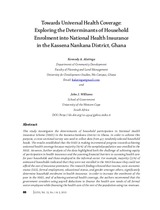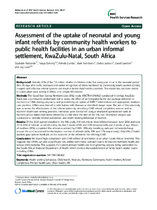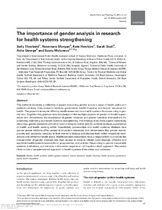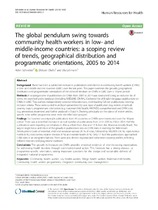| dc.contributor.author | Williams, John J. | |
| dc.contributor.author | Alatinga, Kennedy A. | |
| dc.date.accessioned | 2015-11-16T10:17:44Z | |
| dc.date.available | 2015-11-16T10:17:44Z | |
| dc.date.issued | 2015 | |
| dc.identifier.citation | Alatinga, K. and Williams, J.J. (2015). Towards universal health coverage: Exploring the determinants of household enrolment into National Health Insurance in the Kassena Nankana District, Ghana. Ghana Journal of Development Studies, Vol.12(1 & 2): 88-102 | en_US |
| dc.identifier.issn | 0855-6768 | |
| dc.identifier.uri | http://hdl.handle.net/10566/1972 | |
| dc.description.abstract | This study investigates the determinants of household participation in National Health
Insurance Scheme (NHIS) in the Kassena-Nankana District in Ghana. In order to achieve this
purpose, a cross-sectional survey was used to collect data from 417 randomly selected household
heads. The results established that the NHIS is making incremental progress towards achieving
universal health coverage because majority (67%) of the sampled population was enrolled in the
NHIS. However, further analysis of the data highlighted both the challenge of achieving equity
of participation in health insurance and the yawning financial barriers to accessing health care
for poor households and those employed in the informal sector. For example, majority (77%) of
uninsured households indicated that they were not enrolled in the NHIS because they could not
afford the cost of insurance premiums. The research findings showed that income, socio-economic
status (SES), formal employment, educational status, and gender amongst others, significantly
determine household enrolment in health insurance. In order to increase the enrolment of the
poor in the NHIS, and of achieving universal health coverage, the authors recommend that the
government considers using payroll deductions to finance the health care needs of all formal
sector employees while financing the health care of the rest of the population using tax revenues.
It is also recommeded that the NHIS considers making the payment of insurance premium
flexible, such as allowing housholds to pay in installments or in kind. | en_US |
| dc.language.iso | en | en_US |
| dc.publisher | Faculty of Integrated Development Studies, University for Development studies | en_US |
| dc.rights | Open Access. This article published in the Ghana Journal of Development Studies is freely available at http://www.ajol.info/index.php/gjds/article/view/125124 | |
| dc.source.uri | http://dx.doi.org/10.4314/gjdsv12i1&2.6 | |
| dc.subject | Universal Health Coverage | en_US |
| dc.subject | Kassena-Nankana District | en_US |
| dc.subject | Ghana | en_US |
| dc.subject | National Health Insurance Scheme (NHIS) | en_US |
| dc.subject | Socio-economic status (SES) | en_US |
| dc.subject | Employment | en_US |
| dc.subject | World Health Organization (WHO) | en_US |
| dc.subject | Household participation | en_US |
| dc.title | Towards universal health coverage: Exploring the determinants of household enrolment into National Health Insurance in the Kassena Nankana District, Ghana | en_US |
| dc.type | Article | en_US |
| dc.privacy.showsubmitter | false | |
| dc.status.ispeerreviewed | true | |
| dc.description.accreditation | International Bibliography of Social Sciences | en_US |




